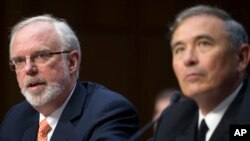China’s influence on North Korea is waning, posing a security threat to the United States, Pentagon officials have warned.
The warning came amid heightened tensions on the Korean Peninsula over North Korea’s threats signaling plans for a long-range rocket launch and subsequent nuclear test.
David Shear, U.S. assistant secretary of defense for Asian and Pacific security affairs, and Admiral Harry Harris Jr., commander of U.S. Pacific Command, told the Senate Armed Services Committee on Thursday that North Korea remained a grave security threat to the United States.
“I think that China’s influence on North Korea is waning, or China doesn’t have the influence on North Korea that it had in the past. So that is also an area of concern,” Harris said.
Shear said China’s influence on North Korea had lessened, particularly under Kim Jong Un’s rule.
“The Chinese reiterated to me, as they have in the past, that their influence with North Korea is limited, particularly under the new regime,” he said.
Shear cited, as an example, the recent military standoff between the two Koreas.
"It wasn’t clear to us that the Chinese had a lot of contact with North Koreans or were able to significantly influence them,” he said.
Harris described North Korea as the “greatest threat” that the United States is facing in the Pacific.
“I think that you have a leader in North Korea who has nuclear weapons and is seeking the means to miniaturize them and deliver them intercontinentally,” he said.
Relations between China and North Korea have cooled since Kim’s rise to power in late 2011. In March 2013, China joined in adopting a U.N. Security Council resolution tightening sanctions against its ally for conducting a nuclear test. Relations deteriorated further after North Korea executed Jang Song Thaek, Kim’s uncle, who had close ties to China.
Unlike his father, who visited China frequently, Kim has yet to visit China. Earlier this month, the young leader skipped China’s high-profile celebrations marking the 70th anniversary of the end of World War II.
Jee Abbey Lee contributed to this report.




